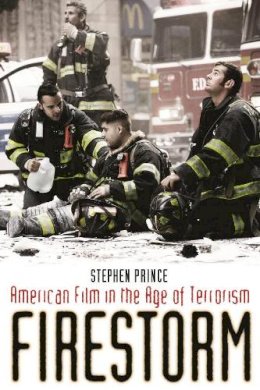
Stock image for illustration purposes only - book cover, edition or condition may vary.
Firestorm: American Film in the Age of Terrorism
Stephen Prince
€ 47.29
FREE Delivery in Ireland
Description for Firestorm: American Film in the Age of Terrorism
Paperback. Num Pages: 400 pages, 30 illus. BIC Classification: 1KBB; 3JMC; APF; JFCA. Category: (U) Tertiary Education (US: College). Dimension: 226 x 154 x 20. Weight in Grams: 500.
It was believed that September 11th would make certain kinds of films obsolete, such as action thrillers crackling with explosions or high-casualty blockbusters where the hero escapes unscathed. While the production of these films did ebb, the full impact of the attacks on Hollywood's creative output is still taking shape. Did 9/11 force filmmakers and screenwriters to find new methods of storytelling? What kinds of movies have been made in response to 9/11, and are they factual? Is it even possible to practice poetic license with such a devastating, broadly felt tragedy? Stephen Prince is the first scholar to trace the effect of 9/11 on the making of American film. From documentaries like Fahrenheit 9/11 (2004) to zombie flicks, and from fictional narratives such as The Kingdom (2007) to Mike Nichols's Charlie Wilson's War (2007), Prince evaluates the extent to which filmmakers have exploited, explained, understood, or interpreted the attacks and the Iraq War that followed, including incidents at Abu Ghraib. He begins with pre-9/11 depictions of terrorism, such as Alfred Hitchcock's Sabotage (1936), and follows with studio and independent films that directly respond to 9/11. He considers documentary portraits and conspiracy films, as well as serial television shows (most notably Fox's 24) and made-for-TV movies that re-present the attacks in a broader, more intimate way. Ultimately Prince finds that in these triumphs and failures an exciting new era of American filmmaking has taken shape.
Product Details
Format
Paperback
Publication date
2009
Publisher
Columbia University Press United States
Number of pages
400
Condition
New
Number of Pages
400
Place of Publication
New York, United States
ISBN
9780231148719
SKU
V9780231148719
Shipping Time
Usually ships in 7 to 11 working days
Ref
99-1
About Stephen Prince
Stephen Prince is a professor of cinema at Virginia Tech, teaching film history, criticism, and theory. He is the author of numerous books, including Classical Film Violence, Movies and Meaning: An Introduction to Film, The Warrior's Camera: The Cinema of Akira Kurosawa, and Savage Cinema: Sam Peckinpah and the Rise of Ultraviolent Movies.
Reviews for Firestorm: American Film in the Age of Terrorism
[Firestorm] will be a popular resource for film students.
James Clarke Times Higher Education Supplement Prince's impressively thorough and intelligently written book will serve as a guide for some years to this visually indelible episode in American history... Essential. Choice offers a detailed and insightful critical analysis while avoiding jargon...Firestorm isa remarkable achievement as a first look at the impact of 11 September on filmmaking, and lays the groundwork for any number of new approaches.
Jeffrey Mazo Survival [A] thoughtful and thorough investigation of the celluloid response to that chilling September day.
Luke Davies The Australian A rich record and accounting of the first decade of responses by both mainstream and marginal American filmmakers.
Corey K. Creekmur Cineaste
James Clarke Times Higher Education Supplement Prince's impressively thorough and intelligently written book will serve as a guide for some years to this visually indelible episode in American history... Essential. Choice offers a detailed and insightful critical analysis while avoiding jargon...Firestorm isa remarkable achievement as a first look at the impact of 11 September on filmmaking, and lays the groundwork for any number of new approaches.
Jeffrey Mazo Survival [A] thoughtful and thorough investigation of the celluloid response to that chilling September day.
Luke Davies The Australian A rich record and accounting of the first decade of responses by both mainstream and marginal American filmmakers.
Corey K. Creekmur Cineaste
